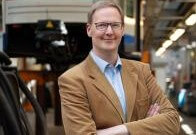With the recent delivery of 10 electric buses from the manufacturer Mercedes-Benz, the share of electric buses in the fleet of Darmstadt, Germany-based mobility service provider HEAG Mobilo has risen to around 65%. With a total of 49 electrically powered buses, HEAG Mobilo will save over 1 million liters of diesel fuel and about 2,850 tonnes of CO2 in 2024.
The vehicles were handed over to HEAG Mobilo managing directors Johannes Gregor and Arne Rath recently, along with a symbolic key from Rüdiger Kappel, head of Public Transport Germany, and André Herrmann, Sales Public Transport Hesse at Daimler Buses. A subsidiary of Daimler Truck, Daimler Buses markets products under brands including Mercedes-Benz.
“The science city of Darmstadt is one of the most polluted regions in Hesse in terms of air quality,” says Gregor. “With our gradual increase in the number of e-buses, we are not only making a contribution to CO2 and noise reduction, we are also more economical on the road thanks to the savings in diesel fuel: The energy cost savings are about a quarter compared with diesel buses.”
The new eCitaro buses are equipped with innovative battery technology that provides a 50% increase in energy density.
“Compared with previous versions, this means around 300 kWh more capacity on board,” says Kappel. “This enables longer ranges without intermediate charging.”
Besides a powerful electric drive, HEAG Mobilo attaches particular importance to safety. In addition to a reversing camera, large protective windows and an active brake assistant, all e-buses have a turning assistant on board to support the driver in critical turning situations.
Expansion of the e-bus fleet and the charging infrastructure are being funded by the Federal Ministry for Digital and Transport (BMDV) with a total of 7.9 million euros as part of the “Directive on the Promotion of Buses with Alternative Drives in Passenger Transport.”
Funding for this measure will also be made available under the German Recovery and Resilience Plan (DARP) through the European Recovery and Resilience Facilities (RRF) in the NextGenerationEU program. The funding guideline is coordinated by NOW GmbH and implemented by Project Management Jülich.





